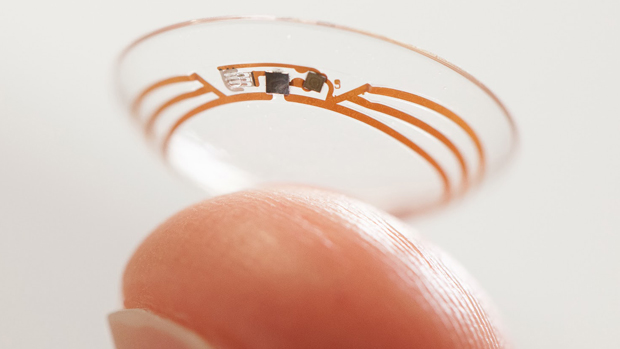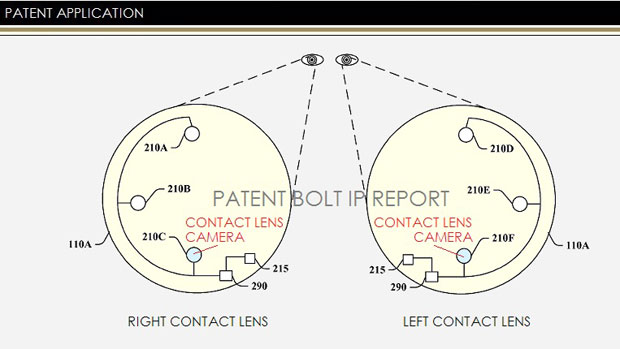Google Glass contact lenses? Tech firm patents lens camera
Google's new smart lens could place wearable computers onto the surface of the eye

A free daily email with the biggest news stories of the day – and the best features from TheWeek.com
You are now subscribed
Your newsletter sign-up was successful
GOOGLE has patented a new camera that fits inside a contact lens, raising the prospect that Glass computer system could be shrunk to fit on the surface of a user's eye.
According to PatentBolt, the device will allow users to capture video from the contact lens without obstructing their own field of vision. This could see the functions of Google's Glass head-mounted computer system being integrated into a significantly less obtrusive device that sits above the iris.
Darrell Etherington, writing for TechCrunch, says that the lens could present a range of medical benefits including "vision augmentation for people with all types of ocular health". PatentBolt suggests that the device could help blind users become aware of their surroundings. For example, users could be notified by sensors within the contact lens on when it is safe to cross roads.
The Week
Escape your echo chamber. Get the facts behind the news, plus analysis from multiple perspectives.

Sign up for The Week's Free Newsletters
From our morning news briefing to a weekly Good News Newsletter, get the best of The Week delivered directly to your inbox.
From our morning news briefing to a weekly Good News Newsletter, get the best of The Week delivered directly to your inbox.
Google says that the system will also be able to detect faces, helping the blind to recognise people they know. Users will control the device by blinking, and the lens will be able to communicate to a smartphone or other peripheral device wirelessly.
Google is also developing a contact lens to help diabetics monitor their glucose levels by taking readings from moisture in users' eyes (pictured above). In a blog post announcing the research, the project's co-founders, Brian Otis and Babak Parviz said: "We're now testing a smart contact lens that's built to measure glucose levels in tears using a tiny wireless chip and miniaturized glucose sensor that are embedded between two layers of soft contact lens material".

Etherington notes that a patent for the camera-enabled lens does not necessarily indicate that a device will come to market. "Big tech companies patent stuff all the time, and only a fraction of that ever makes it to shipping products," he says. "Still, as an assistive device, and an alternative to other, more obvious gadgets and intrusive tech like hearing aids or cochlear implants, this could be a tech that has legs in the near future".
A free daily email with the biggest news stories of the day – and the best features from TheWeek.com
-
 Political cartoons for February 21
Political cartoons for February 21Cartoons Saturday’s political cartoons include consequences, secrets, and more
-
 Crisis in Cuba: a ‘golden opportunity’ for Washington?
Crisis in Cuba: a ‘golden opportunity’ for Washington?Talking Point The Trump administration is applying the pressure, and with Latin America swinging to the right, Havana is becoming more ‘politically isolated’
-
 5 thoroughly redacted cartoons about Pam Bondi protecting predators
5 thoroughly redacted cartoons about Pam Bondi protecting predatorsCartoons Artists take on the real victim, types of protection, and more
-
 Will AI kill the smartphone?
Will AI kill the smartphone?In The Spotlight OpenAI and Meta want to unseat the ‘Lennon and McCartney’ of the gadget era
-
 Has Google burst the Nvidia bubble?
Has Google burst the Nvidia bubble?Today’s Big Question The world’s most valuable company faces a challenge from Google, as companies eye up ‘more specialised’ and ‘less power-hungry’ alternatives
-
 How the online world relies on AWS cloud servers
How the online world relies on AWS cloud serversThe Explainer Chaos caused by Monday’s online outage shows that ‘when AWS sneezes, half the internet catches the flu’
-
 Is the UK government getting too close to Big Tech?
Is the UK government getting too close to Big Tech?Today’s Big Question US-UK tech pact, supported by Nvidia and OpenAI, is part of Silicon Valley drive to ‘lock in’ American AI with US allies
-
 Google: A monopoly past its prime?
Google: A monopoly past its prime?Feature Google’s antitrust case ends with a slap on the wrist as courts struggle to keep up with the tech industry’s rapid changes
-
 South Korea's divide over allowing Google Maps
South Korea's divide over allowing Google MapsTalking Points The country is one of few modern democracies where the app doesn't work
-
 Google avoids the worst in antitrust ruling
Google avoids the worst in antitrust rulingSpeed Read A federal judge rejected the government's request to break up Google
-
 Is AI killing the internet?
Is AI killing the internet?Talking Point AI-powered browsers and search engines are threatening the death of the open web